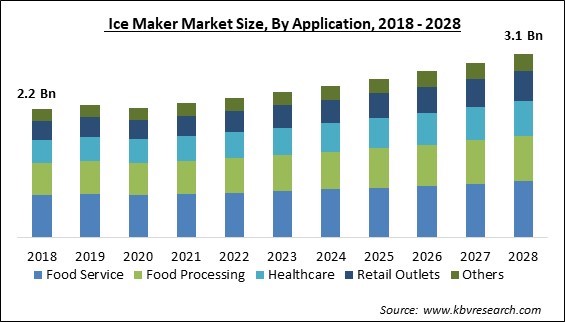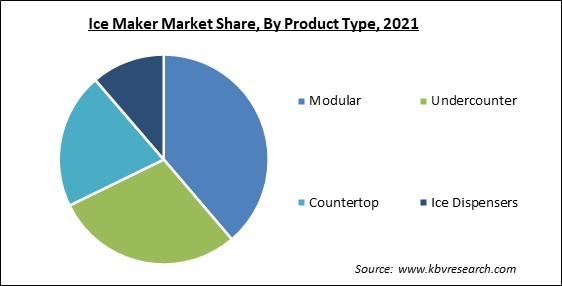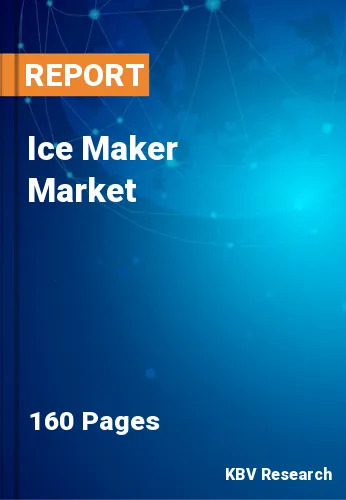The Global Ice Maker Market size is expected to reach $3.1 billion by 2028, rising at a market growth of 4.7% CAGR during the forecast period.
An ice maker, also known as an ice generator or an ice machine, is a device that creates ice artificially. There are four varieties of ice makers in the market that are, undercounter, modular, countertop, and ice dispensers. This equipment is frequently utilized in the food service business, the food processing industry, the healthcare industry, and retail establishments.

The expansion of the hospitality sector fuels the demand for ice makers in commercial kitchens. In addition, the growth of the food service industry and demand for chilled alcoholic or non-alcoholic beverages propels the ice maker market's expansion in terms of revenue. In addition, a regional, competitive, and segment-based study of the ice maker market is conducted.
The category of ice cube makers, among other products, dominates the market due to the manufacturing of rhomboid ice cubes, which are widely utilized in restaurants worldwide. In addition, the food service industry, which holds a considerable market share, uses the product extensively. This segment's rise can be ascribed to the urban population's increased propensity for eating at restaurants, hotels, and cafes.
The rising demand for ice in the healthcare industry to store organs and aid in recovery operations is one of the most significant elements driving market expansion. In addition, the product is utilized in biotechnology, microbiology, and genetic engineering laboratories to keep biological samples, facilitating their transportation to other facilities.
The COVID-19 pandemic has had a severe effect on the market growth of ice makers. The emergence of the virus hindered the operation of the meat-packing sector, hence decreasing the demand for ice. Furthermore, due to limitations on movement and mass quarantines, the hospitality & restaurant industries experienced a sharp fall in revenue, which negatively impacted market revenue. The recent announcement of the closure of a significant hospitality business sector, including pubs & bars, full-service restaurants, and quick-service restaurants, has severely hindered ice maker sales.
The restaurant sector expanded rapidly due to the strengthening of the global economy, the rise in discretionary spending, and the increased speed of consumer life. The expansion of the market for ice makers is likely to be stimulated by the rapid expansion of the quick-service restaurant industry. In addition to the changing growth characteristics of the food retailing industry and the rising popularity of e-commerce, the use of ice makers for food preservation is projected to increase in the next years.
Due to rising electricity costs and environmental concerns, the energy consumption of ice makers stays the primary issue that may have the most influence on consumer decisions. Manufacturers are using technical solutions to optimize electricity use in ice makers and introducing energy-efficient ice makers to attract a bigger client base. In addition to providing energy-efficient ice makers, producers in the ice maker market offer ice maker accessories, like ice totes, ice scoops, and ice caddies, to distinguish themselves from the market's intense rivalry.
Making an ice maker requires specialized work and professional knowledge, in addition to being expensive. High manufacturing costs result in increased product pricing, further inhibiting market expansion. Large expenditures are also necessary to create flexible production lines that adapt to changing consumer demand for different ice makers. As a result, one of the main factors that may hinder the growth of the ice maker market during the forecast period is the high initial investment and working capital needed to construct a clear ice maker manufacturing plant.
Based on product type, the ice maker market is segmented into modular ice maker, undercounter ice maker, countertop ice maker, and ice dispensers. In 2021, the modular ice maker segment held the highest revenue share in the ice maker market. Modular ice makers are available in various sizes and create vast quantities of ice, enhancing their demand among large businesses such as food services, hospitals, and others. Manufacturers of commercial ice machines produce these ice makers more frequently than any other sort. They are a good alternative for most organizations because they provide numerous options in size and square footage.
By application, the ice maker market is bifurcated into food service, food processing, healthcare, retail outlets, and others. The healthcare segment recorded a remarkable revenue share in the ice maker market in 2021. This segment's product demand is fueled by the rising demand for ice makers in the healthcare industry for applications like cold compression therapy, 0vaccine transport, and tissue and organ transplants. Most typically, chewable nugget ices are utilized in healthcare units or facilities for patients who have difficulty swallowing liquids or require cold compress treatments to recover.

| Report Attribute | Details |
|---|---|
| Market size value in 2021 | USD 2.3 Billion |
| Market size forecast in 2028 | USD 3.1 Billion |
| Base Year | 2021 |
| Historical Period | 2018 to 2020 |
| Forecast Period | 2022 to 2028 |
| Revenue Growth Rate | CAGR of 4.7% from 2022 to 2028 |
| Number of Pages | 160 |
| Number of Table | 290 |
| Report coverage | Market Trends, Revenue Estimation and Forecast, Segmentation Analysis, Regional and Country Breakdown, Companies Strategic Developments, Company Profiling |
| Segments covered | Application, Product Type, Region |
| Country scope | US, Canada, Mexico, Germany, UK, France, Russia, Spain, Italy, China, Japan, India, South Korea, Singapore, Malaysia, Brazil, Argentina, UAE, Saudi Arabia, South Africa, Nigeria |
| Growth Drivers |
|
| Restraints |
|
Region wise, the ice maker market is analyzed across North America, Europe, Asia Pacific and LAMEA. In 2021, the North America region dominated the ice maker market with maximum revenue share. The significant penetration of ice in the food business, coffee shops, bars, and lounges is a major factor in the expansion of the ice maker market. Regional market expansion is anticipated to be driven by a rise in the adoption of modular kitchens with high-tech appliances in the commercial and residential sectors.
Free Valuable Insights: Global Ice Maker Market size to reach USD 3.1 Billion by 2028
The market research report covers the analysis of key stake holders of the market. Key companies profiled in the report include MiddleBy Corporation, Hoshizaki Corporation, Manitowoc, Inc. (Pentair plc), U.S. Ice Machine Manufacturing Co., A & V Refrigeration, Ali Group S.r.l., Cornelius, Inc. (Marmon Foodservice Technologies, Inc.) (Berkshire Hathaway, Inc.), Howe Corporation, North Star Ice Equipment Corporation and Whynter LLC.
By Application
By Product Type
By Geography
The global Ice Maker Market size is expected to reach $3.1 billion by 2028.
Broad range of commercial uses of ice makers are driving the market in coming years, however, High investments required at the initial stage restraints the growth of the market.
MiddleBy Corporation, Hoshizaki Corporation, Manitowoc, Inc. (Pentair plc), U.S. Ice Machine Manufacturing Co., A & V Refrigeration, Ali Group S.r.l., Cornelius, Inc. (Marmon Foodservice Technologies, Inc.) (Berkshire Hathaway, Inc.), Howe Corporation, North Star Ice Equipment Corporation and Whynter LLC.
The Food Service segment is leading the Global Ice Maker Market by Application in 2021 thereby, achieving a market value of $963.8 Million by 2028.
The North America market dominated the Global Ice Maker Market by Region in 2021, and would continue to be a dominant market till 2028; thereby, achieving a market value of $1.1 billion by 2028.
Our team of dedicated experts can provide you with attractive expansion opportunities for your business.

